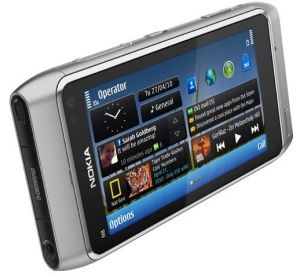Nokia: OLED company spotlight - Page 6
Nokia: The OLED in the N8 is better than the one used in the N86 in sunlight
AllAboutSymbian has posted an interesting interview with Damian Dinning, Nokia's Imaging Chief - talking about the upcoming N8. He says that Nokia chose an AMOLED because of the richer colors and wide viewing angles. He also says that the new AMOLED used in the N8 is 'definitely' better than previous AMOLED efforts from Nokia (like the N86 and N85). It's not known how it compares to Samsung's 'Super AMOLED'.
This is good news, as users of the n85 has been complaining about sunlight readability: saying it is totally useless in such situations.
The Nokia N8 to launch on August 24th in Europe, priced at €370
Is Nokia preparing a new 3.7" AMOLED phone?
 There are rumors that Nokia is preparing a new handset, called the N87 Vasco, which will have a 3.7" touch AMOLED. It will also have a 12mp camera (Carl Zeiss optics & Xenon flash, with infra-night vision), Wi-Fi, GPS, FM radio & transmitter, ARM Cotex 8 CPU (800Mhz), 16/32Gb of internal memory.
There are rumors that Nokia is preparing a new handset, called the N87 Vasco, which will have a 3.7" touch AMOLED. It will also have a 12mp camera (Carl Zeiss optics & Xenon flash, with infra-night vision), Wi-Fi, GPS, FM radio & transmitter, ARM Cotex 8 CPU (800Mhz), 16/32Gb of internal memory.
Samsung's Omnia II vs Nokia's N900 in direct sunlight
UPDATE: This video has been removed from YouTube
Yesterday we posted a video comparing the Samsung Omnia II's OLED vs the Nokia N900's LCD (and the OLED is much better, of course). Now the same user has uploaded another video, showing how the displays behave in direct sunlight - and the OLED is much better. This is interesting, as usually people say that OLED are very bad in such conditions. A couple of months ago we posted a story on this - showing examples of OLEDs in sunlight that are completely non-readable. Barry Young from the OLED association told us that newer OLED displays will be much brighter - perhaps he was right.
Comparing the Samsung Omnia II's OLED vs the Nokia N900 LCD
Top OLED gadgets for the 2009 holiday season
So the 2009 holiday season is almost here - and obviously you'd like a new gadget with an OLED display. So what are your options?
OLED TVs
Sadly, there aren't that many OLED TVs around as we'd hope for. Sony is still selling the XEL-1 (at around $2,200) - but you should hurry, as they have stopped the production line, and will soon stop offering this TV. Your other option is LG's 15" OLED TV - but this is currently available in Korea only, for around $2600. It's probably best to wait a few years before actually buying an OLED TV...

Mobile phones
There are many OLED phones you can choose from... it seems that every week Samsung releases yet another smartphone with a large touch OLED. Samsung currently offers dozens of models - including the Impression, the Moment, the Behold II, the Omnia II and the Jet. Nokia is offering the N86 and even HP recently announced an OLED phone - the iPAQ Glisten.
 Samsung Moment
Samsung MomentDigital Cameras
Compared to mobile phones, there are very little OLED digital cameras around... There's the Samsung TL320 and the NV24HD, and also Nikon's new S70 - with a large touch AMOLED, 12Mp sensor and 5X optical zoo.
 Nikon S70
Nikon S70The Nokia N86 finally arrives in north America
Rogers Wireless in Canada is the first north-American carrier to sell the Nokia N86, on their 3G HSPA network. It sells for $100 (with a 3 year plan that includes a data plan).
 Nokia N86
Nokia N86The N86 can also be bought unlocked in the US for 395$. The N86 has a 2.6" AMOLED display, 8Mp camera, 8Gb of memory and a microSD.
The N86 is now available in the US
The Nokia N86 is finally available for US customers - being sold unlocked for 469$.

The N86 is a dual slider with 8Mp camera, 2.6" OLED, 3G and WiFi.
Nokia to release a new AMOLED phone soon?
 Engadget reports that there are rumors that Nokia is set to release a new AMOLED phone next month. The Erdos (part of the high-end 8xxx series) has a 2.4" (320x240) OLED display, A-GPS, 3G support, Wi-Fi, USB, a 5Mp camera and 8Gb of internal memory. It's an ultra-thin, ultra-shiny slider.
Engadget reports that there are rumors that Nokia is set to release a new AMOLED phone next month. The Erdos (part of the high-end 8xxx series) has a 2.4" (320x240) OLED display, A-GPS, 3G support, Wi-Fi, USB, a 5Mp camera and 8Gb of internal memory. It's an ultra-thin, ultra-shiny slider.
OLEDs in sunlight
OLED is an emissive display technology - which means that it emits its own light, in contrast to a reflective display - which uses an external light source - an ePaper display for example, or an LCD which is a display that blocks light from a backlight unit.
OLEDs are bright, and provide great image quality, and as of 2021, these displays perform very well under direct sunlight.
But this was not always the case. In early AMOLED displays, sunlight readability was very poor. The 2008 Nokia N85 for example, one of the first products with AMOLED displays, behaved very poorly in direct sunlight, as can be seen in the image below:

The problem in early AMOLED displays resulted from reflectance from metal electrodes in addition to relatively low brightness. Display makers however, soon upgraded their OLED displays to increase performance. Helped by new technologies and materials, OLED displays quickly overcame the sunlight readability problem. Today OLED displays actually perform better than the best LCDs in direct sunlight.
Pagination
- Previous page
- Page 6
- Next page


